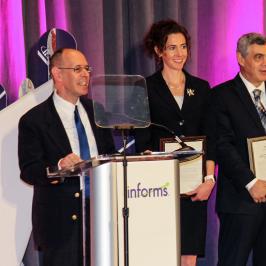
Credit: University of Illinois Department of Computer Science
As Professor Sheldon Jacobson watched the September 2001 terrorist attacks unfold, he was among the many Americans who realized that life was about to change.
What he did not know was that a National Science Foundation-funded research project he began just days before would be part of that change, creating the groundwork for The Transportation Security Administration's PreCheck system. Precheck uses risk profiles to try to focus air security resources on higher-risk passengers.
The work Jacobson and three of his PhD students carried out while he was part of Department of Mechanical & Industrial Engineering has now been recognized with an IMPACT Prize from The Institute for Operations Research and the Management Sciences. The IMPACT Prize is awarded every two years and recognizes operations research that has had widespread impact.
The award highlights work whose effects have played out over a generation, from the morning of Sept. 11, 2001, through PreCheck's adoption in 2011 to the recognition of the prize itself this month.
Adrian Lee, another of Professor Sheldon Jacobson's former students, also shared in the IMPACT Prize. Adrian Lee, another of Professor Sheldon Jacobson's former students, also shared in the IMPACT Prize.
"It's a real tribute to a number of people. The students did a phenomenal job in implementing this. (And) Ken Fletcher — without him, we wouldn't be getting the award because someone had to make it into reality and we didn't have the power to do that," Jacobson said, referring to the now-retired chief risk officer of the TSA who used the research to design PreCheck. "This is something that really has changed a lot of people's lives."
And their taxes.
Using his own research and the work of other researchers, Jacobson put what he calls a conservative estimate of the amount of money saved by the program at more than $350 million a year in direct costs alone.
The key is the roughly 1 million airline-passenger screenings a day that are PreCheck-qualified passengers. They use dedicated lanes available at more than 200 U.S. airports that require fewer TSA staff members than enhanced screening lanes.
For the first decade after the attacks, the TSA essentially assumed that all passengers carried the same potential security risks and screened them all accordingly. That situation required either an expensive commitment of resources and time or, assuming that the agency would never have enough of either, the probability that some passengers would inevitably be underscreened.
The NSF-funded work that Jacobson had just begun when the attacks happened included a cost-benefit analysis of whether all baggage should be screened using essentially the same technology used in CAT scans.
"We can't treat everybody like a terrorist. You have to treat people commensurate with their risk and that was the kind of nascent idea of what became risk-based security," Jacobson said. "How can we take security resources and passenger risk and bring them together in an optimal way? So we used optimization models to analyze systems."
The three students Jacobson worked with over a period of years and who share in the award were Laura Albert, who is now an associate professor of Industrial and Systems Engineering and assistant dean for Graduate Affairs, at the University of Wisconsin, Madison; Alexander Nikolaev, now an associate professor of Industrial and Systems Engineering at University at Buffalo; and Adrian Lee, who is president of Central Illinois Technology and Education Research Institute.
Albert, Jacobson said, was part of what he called the "Ah ha! moment" when the use of dynamic rather than static models for passenger screening – looking at passenger risk over a period of time rather than focusing on any particular moment – started to make sense.
Later, Nikolaev came up with the policies that would be best for implanting the system. And Lee, whose background was in control theory, worked to sort out a balance between underscreening and overscreening passengers.
"How do you do that? Every person has a risk profile," Jacobson said.
The prize represents a form of validation, not so much for Jacobson or his former students as for the power and reach of a major research university, he said.
"So often we're criticized in academia, that we're not doing anything relevant," he said. "The prize recognizes the fact that this institution, the University of Illinois, can facilitate things like this, and I'm just one of 2,000 faculty members doing things, working hard, and serving."
###
Media Contact
David Mercer
[email protected]
217-300-5311
@EngineeringAtIL
http://engineering.illinois.edu/
Original Source
https://cs.illinois.edu/news/jacobson-recognized-research-transformed-passenger-screening-after-2001-attacks





